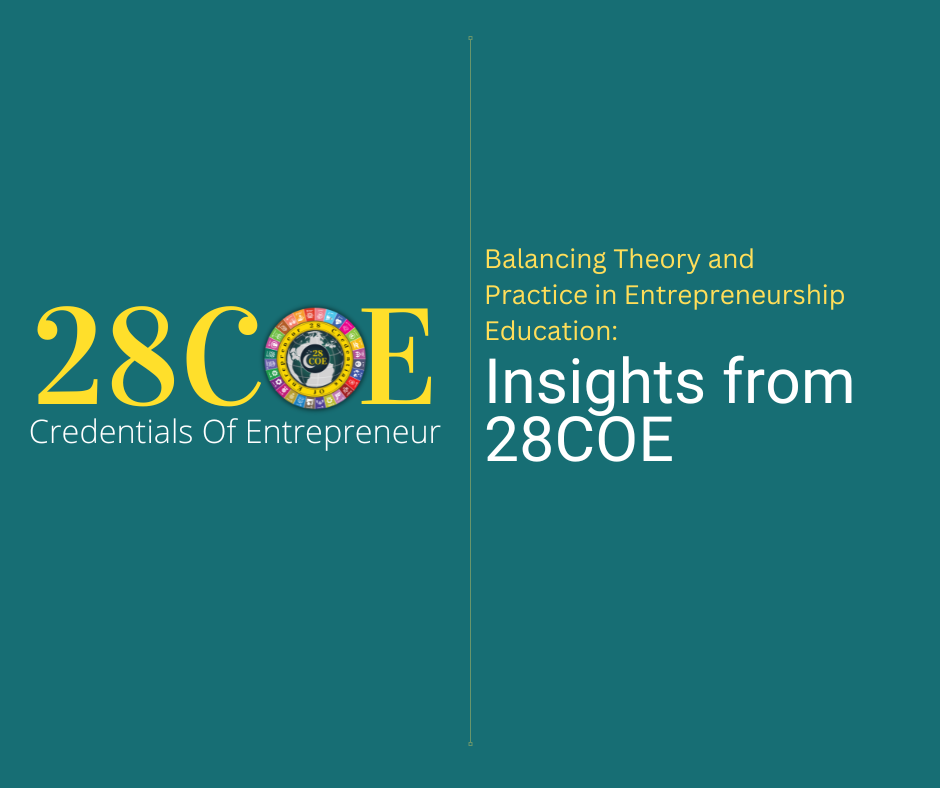Introduction
Entrepreneurship education is a multifaceted field that requires a delicate balance between theoretical knowledge and practical application. The “28 Credentials of Entrepreneur” (28COE) platform exemplifies this balance by offering an innovative approach to fostering entrepreneurial skills globally. This avant-garde platform, now legally integrated into approximately 90 nations, is dedicated to nurturing the aspirations of millennials, startups, visionary business individuals, and professional leaders. By creating a vibrant ecosystem that promotes cross-border collaboration, 28COE bridges the gap between theory and practice, uniting a diverse range of stakeholders in the entrepreneurial sphere.
The Role of Theory in Entrepreneurship Education
Theory provides the foundational knowledge essential for understanding the complex nature of entrepreneurship. It includes learning about business models, market analysis, strategic planning, financial management, and innovation theories. This theoretical framework equips aspiring entrepreneurs with the cognitive tools needed to navigate the entrepreneurial landscape. Through structured curricula, case studies, and academic research, students gain insights into the dynamics of starting and managing a business, the importance of leadership, and the impact of economic policies on entrepreneurship.
The Importance of Practice
While theoretical knowledge is crucial, practical experience is equally important in entrepreneurship education. Practice involves applying theoretical concepts to real-world scenarios, which helps students develop critical thinking, problem-solving skills, and resilience. Practical experience can be gained through internships, mentorship programs, business simulations, and entrepreneurial projects. These hands-on activities allow aspiring entrepreneurs to test their ideas, learn from failures, and adapt to changing market conditions.
The 28COE Approach to Balancing Theory and Practice
28COE excels in integrating theory and practice by providing a comprehensive platform that supports entrepreneurial education and development. Its mission to foster and bolster the dreams of entrepreneurs worldwide is achieved through several key strategies:
- Global Integration and Collaboration: By operating in nearly 90 countries, 28COE facilitates cross-border collaboration, enabling entrepreneurs to share knowledge and experiences. This global network connects investors, stakeholders, policymakers, and researchers, creating a rich tapestry of theoretical and practical insights.
- Flexible Learning Pathways: 28COE offers adaptable programs that cater to diverse learning needs and stages of entrepreneurial development. This flexibility ensures that both novices and experienced entrepreneurs can benefit from the platform’s resources.
- Real-World Applications: The platform emphasizes real-world applications of theoretical knowledge through mentorship, networking events, and business incubators. These initiatives provide practical experience and allow entrepreneurs to implement their ideas in a supportive environment.
- Research and Development: By fostering collaboration among researchers and academic institutions, 28COE promotes the development of new theories and practical methodologies in entrepreneurship. This continuous exchange of knowledge ensures that the platform remains at the forefront of entrepreneurial education.
Conclusion
Balancing theory and practice in entrepreneurship education is essential for cultivating successful entrepreneurs. The 28 Credentials of Entrepreneur (28COE) platform serves as a model for achieving this balance by combining theoretical foundations with practical applications. Through its global reach, flexible learning pathways, and emphasis on real-world experience, 28COE creates an environment where entrepreneurs can thrive. By uniting a diverse array of stakeholders, 28COE not only supports individual entrepreneurial journeys but also contributes to broader economic growth and innovation.

